Author Archives: Chanel Dubofsky
February 23, 2017 by Chanel Dubofsky
How Repealing the ACA Could Specifically Impact Jewish Women
 Since the beginning of the Trump administration, we’ve seen the destruction of social safety nets that benefit the most vulnerable Americans, particularly women and folks of color. This destruction isn’t even limited to the U.S.—as one of his first executive actions, Trump reinstated the Global Gag Rule, a policy dictating that no federal funding will be given to non-governmental organizations around the world providing abortion counseling or support for abortion in any way, without including the usual exemptions that even anti-choice administrations typically make available.
Since the beginning of the Trump administration, we’ve seen the destruction of social safety nets that benefit the most vulnerable Americans, particularly women and folks of color. This destruction isn’t even limited to the U.S.—as one of his first executive actions, Trump reinstated the Global Gag Rule, a policy dictating that no federal funding will be given to non-governmental organizations around the world providing abortion counseling or support for abortion in any way, without including the usual exemptions that even anti-choice administrations typically make available.
In the U.S., the Affordable Care Act, otherwise known as ObamaCare has allowed 20 million Americans who previously did not have health insurance to access it. The A.C.A. has always been under attack, but Trump has vowed to take it apart completely, and the process to repeal and replace has already begun. The language around health care policy isn’t necessarily accessible to the average person, but one thing is clear about what the dismantling of the A.C.A. and the defunding of Planned Parenthood means: people who need preventative care the most, including Jewish women, won’t be able to afford it, and the results of that fact will be devastating.
- No Comments
December 20, 2016 by Chanel Dubofsky
New Study Shows Abortion Has No Negative Impact on Mental Health
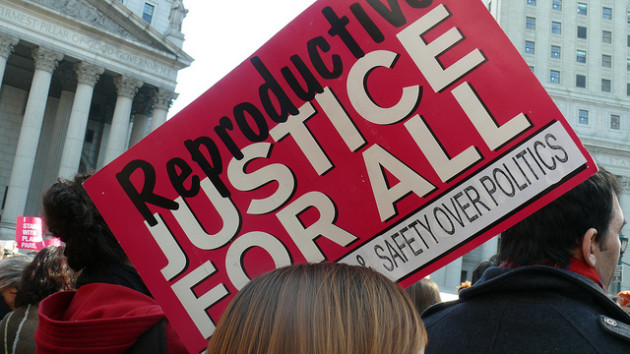
Photo by Charlotte Cooper
In 1988, then President Ronald Reagan charged Surgeon General C. Everett Koop with the task of creating a report declaring a link between abortions and decreased mental health quality. Koop didn’t deliver on the study; instead, in 1989, he sent Reagan a letter which stated that “the available scientific evidence about the psychological sequelae of abortion simply cannot support either the preconceived notions of those pro-life or those pro-choice.” Koop recommended that in order to assess the actual effects of abortion on women’s mental health, a long and comprehensive study needed to be conducted.
The notion that having an abortion will destroy you emotionally didn’t begin with the Reagan administration, and it didn’t end with Koop’s assertion that there was not enough data to prove it. Anti-choice folks claim the existence of “Post Abortion Traumatic Stress Syndrome,” indicated by guilt, anxiety, avoidance of children and pregnant women, numbness, depression, suicide, etc, after having an abortion. Although neither the American Psychological Association nor the American Psychiatric Association has acknowledged Post Abortion Syndrome as being real, that hasn’t stopped the anti-choice movement from perpetuating the myth of it, particularly in crisis pregnancy centers.
- No Comments
March 20, 2014 by Chanel Dubofsky
“I Wanted to Be Pat Boone’s Daughter.”
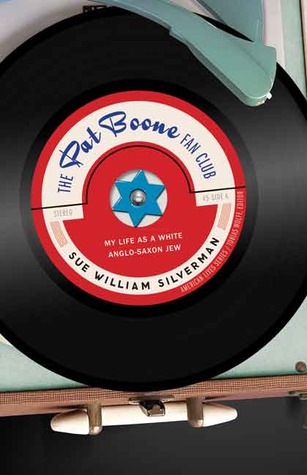
When Sue William Silverman and I met to discuss her new memoir, The Pat Boone Fan Club: My Life as a White Anglo Saxon Jew, she played “Exodus” for me on her iPhone. (Boone actually wrote the lyrics for the theme song for the movie Exodus, which lyrics he titled “This Land Is Mine.”)
Me: It sounds really…generic.
Sue William Silverman: Everything about Pat Boone is generic. That’s why I loved him, I could make him into anyone I wanted him to be.
Silverman’s memoir is a story of among other things, evolving identity, of wishing your reality wasn’t yours in the most profound way, of doing whatever it takes to escape it and become yourself.
Lilith: The Pat Boone Fan Club opens with a quote from James Baldwin:
“Identity would seem to be the garment with which one covers the nakedness of the self: in which case, it is best that the garment be loose, a little like the robes of the desert, through which one’s nakedness can always be felt, and, sometimes, discerned. This trust in one’s nakedness is all that gives one the power to change one’s robes.”
Can you comment on why you include this?
Sue Silverman: To me, this quote conveys the complexity of identity, which is what I explore in the book. How, when, and why do we change our identity? What parts of ourselves do we reveal?
For me, growing up in a troubled, incestuous family, I lost a sense of my true self, including a sense of my Judaism. Throughout the book, I tumble through various identities: I tried to pass as Christian; I tried being a kibbutznik, picking apricots in Israel; as a hippie, I tramped cross-country in a VW camper; I vacationed in Yugoslavia with a boyfriend who, it turned out, was anti-Semitic; I married – and divorced – two Christian men.
More than anything – and this is the heart of the book – I wanted to be Pat Boone’s daughter. I wanted that very Christian, squeaky-clean 1960s pop star to adopt me. Why? Because my father sexually molested me growing up.
But why Pat Boone? For hours, as a young girl, I gazed at photos of him and his beaming, golden family in fan magazines. If Pat Boone could raise four daughters, couldn’t he raise me, too? In my child-mind, he was the ideal of what a father should be: someone nurturing, caring, safe.
So the identity I most wanted was that of Pat Boone’s fifth daughter!
- 2 Comments
January 29, 2014 by Chanel Dubofsky
It’s Always a Scene at the Clinic
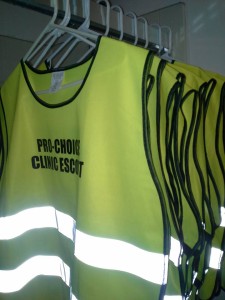
Image via The Clinic Vest Project
I. At the clinic, there is the usual bank of protesters at the curb, holding pictures of white skinned Jesus and white skinned babies, along with large crosses. They’re praying loudly in Spanish and English. It’s a scene. It’s always a scene. The protesters in the front and back, and us, in our orange vests, watching, opening doors. Sometimes people ask us if we get paid to stand there. The protesters refer to us as “Satan.”
II. H is a friend of mine who lives in Los Angeles, where he writes and makes tv shows and escorts at a clinic. We talk about how this week, the Supreme Court is taking up McCullen vs. Coakley, a lawsuit against a 2007 Massachusetts law stating that anti-abortion protesters must remain behind a yellow line painted on the sidewalk, preventing them from interacting with patients and staff entering the clinic. We talk about Occupy LA and Occupy Wall Street, how brigades of police officers followed protesters and journalists everywhere, looking for any excuse to arrest them. H says, “Law enforcement and legal communities are not exactly clamoring to expand the liberties of those protesting against capitalism or racism, but protesters trying to destroy women’s lives is okay. It’s bullshit.”
III. One Saturday, a young man with a hipster beard, wearing corduroys, called to a woman entering the clinic, “You don’t have to do this, you know.” P, another escort, put his body between the young man’s and hers and walked her to the door. Later, the same young man leads a church group from Texas in a truncated version of the exorcism prayer, which I recognize from horror movies.
IV. Sometimes, while we’re watching the protesters, we talk about why we come here, why we do this. P says it’s because he can see the result immediately- the patient needs health care, there’s this obstacle of the protesters, you get the patient to the door, you’ve done something. I say it’s because I’m angry, which is the truth, but also, it’s thicker than anger.
V. Shrinking the buffer zone, or getting rid of it all together, would mean that the young man who did the exorcism, and the folks praying on the curb, and the monks who gather at the back of the clinic and follow people who walk out down the street, could get as close to the patients and the clinic staff and the escorts as they want. This means hands that grab and push pictures of “aborted” fetuses at people who are about to undergo a medical procedure, whether that’s an abortion or a pap smear. (If you’re questioning whether or not this “counts” as an act of intimidation or violence, consider if you would want to be in the same situation. If you would like to find out how you’d feel.) In RH Reality Check’s Legal Wrap, Jessica Mason Pieko wrote, “the underlying question…. Just how much violence against women is constitutionally permissible?”
VI. In the United States, we are not sure about women. We’re suspicious. We’re not sure if women think about things. We’re not sure if they deserve space, or trust, or agency. We’re not sure if women are human.
- 1 Comment
November 21, 2013 by Chanel Dubofsky
My “Good Woman” Brain
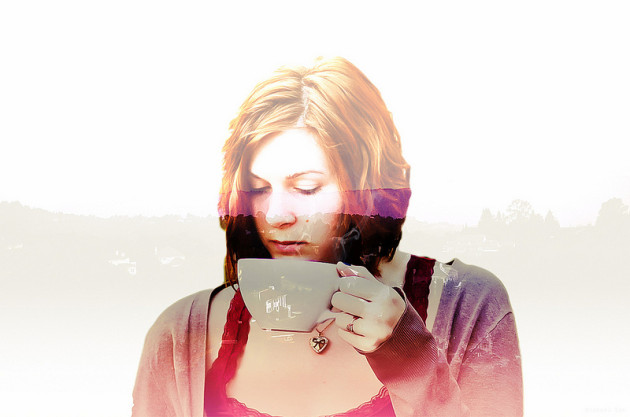 I grew up on tea. Lipton, with lots of milk and sugar. I didn’t know about the herbal kind until college, which, it turns out, I don’t actually like; everything but that sugary, almond colored tea tastes like hot, wet grass.
I grew up on tea. Lipton, with lots of milk and sugar. I didn’t know about the herbal kind until college, which, it turns out, I don’t actually like; everything but that sugary, almond colored tea tastes like hot, wet grass.
Yesterday I drank a lot of green tea. I spent the previous 24 hours sicker than I’ve been in a very long time. (The kind of sick you don’t want me to describe in a blog post.) The kind of sick that made me terrified of anything but dry toast, ginger ale and tea that I don’t even like.
Today was my foray back into dairy. It was fine, mostly, except for the part of my brain that was triggered by the fact that for the last few months, I’ve avoided dairy. Not because of my stomach (I am not among the lactose intolerant Jews), but because I’ve been kind of vegan-y lately.
I have a lot of qualms about veganism. There’s the class privilege piece–protein substitutes and the loads of fresh vegetables are expensive and not accessible to everyone. There’s the judgment and fat shaming piece that tends to rear its head–if only you could control yourself, if you only had your priorities straight and right, if you could only be less selfish and less wasteful.
I kept kosher for ten years. I stopped for a few reasons–I couldn’t find meaning in it anymore, I was no longer invested in halacha (it’s doubtful that I ever was, no matter how much I tried to convince myself that I wanted to be), but mainly, I was using kashrut as another way to control food, and not in a holy way. I wanted to be a person, a woman, who controlled food. A good woman.
A good woman shows everyone that she is trying, one way or another, to be better. She talks about going to the gym, how much she goes, how long she spends there. When her coworkers bring in baked goods or other treats, she will ignore them, or she will eat one and then say, “Oh, this is so bad for me!” She will say to others who do not eat it, “You have so much self control!” A good woman feels badly about her weight, no matter what it is. As long as she knows that she is not okay the way she is, she is good.
It’s this “good woman” brain, sexist and awful as it is, that comes back when I do things like tell myself I’m going to stop eating dairy. I recognize it. It’s the same thing I used to do when I kept kosher–I would never, ever eat a cheeseburger again. Look how strong I am. I am a person who does not need a cheeseburger. Even better, I don’t want a cheeseburger. I am a good woman. I have strength.
I ate a cheeseburger. I ate dairy. I’ll eat them again. I’ll eat them because I know what the bottom of that hole of “ not eating that ever again” looks and feels like. Doing that makes me hate myself, which is exactly what the sexist machine wants- to distract us from being powerful by making us believe we are never good enough. I ate it because I don’t need to be a good woman or a good Jew, I need to be a real person.
photo credit: michael+yan via photopin cc
- No Comments
October 2, 2013 by Chanel Dubofsky
Putting My Mother Back Together

Really, I am just trying to put her back together. The woman I knew as my mother was dismantled, by illness and by fear and trouble, but there’s the person I didn’t know, ever, and I am trying to find her.
I made one phone call, to G, my cousin, the daughter of one of my grandmother’s sisters. I sent one email, to my uncle. It took me a long time to do this, and I finally managed it in one of those middle of the night seizures of bravery. All you require is one moment of insane bravery, someone wrote. Or at least something that can pass for insane bravery.
The email I wanted to send to my uncle, my mother’s only brother, was something like, “Can you tell me what the hell happened?” Instead, it was kind of desperate, admitting to him that I had never asked her certain questions while she was alive (How had she met my father? Why hadn’t she gone to college after she’d been accepted? What else had happened to her in her life?), and hoping he could tell me something. The specific questions I had had no longer seemed terribly important. Anything he could do to fill out my hollow picture would do.
- 1 Comment
August 29, 2013 by Chanel Dubofsky
A Blue Slip and a Bag of Letters
 There are two new things of relevance. First is a blue slip, belonging to my grandmother, which I unearthed from a bag of other things of hers in a closet. (Also in the bag: letters and cards I sent her, a sweater of hers which used to be mine.) I kept the slip, and threw away everything else. The slip is narrow and stiff, and even though I aspire to be the kind of person who’s daring enough to wear it as a skirt, I never will. It’s strange that I’m keeping it, the memories that it carries are the least pungent.
There are two new things of relevance. First is a blue slip, belonging to my grandmother, which I unearthed from a bag of other things of hers in a closet. (Also in the bag: letters and cards I sent her, a sweater of hers which used to be mine.) I kept the slip, and threw away everything else. The slip is narrow and stiff, and even though I aspire to be the kind of person who’s daring enough to wear it as a skirt, I never will. It’s strange that I’m keeping it, the memories that it carries are the least pungent.
The second thing is a set of wooden bookends in the shape of ducks. Mallards, I think, but really, I don’t know ducks. My uncle sent them to me after I replied yes to his email: “Your aunt and I are doing some cleaning and we found these bookends. I bought them for your mother years ago at Johnson’s Bookstore. Now that you have your own place, would you want them?”
I remember these bookends from our house- heavy, but oddly slippery on the bottom. They probably can’t be trusted to support too many books. They’re kitschy. When I said yes to them, I was thinking about my grandmother telling me that one day, when I had a house, I could put all the antiques she collected and would leave me in it. I couldn’t imagine owning a house and filling it with so many things that were so beautiful and so cumbersome. But these are just bookends.
- 1 Comment
July 24, 2013 by Chanel Dubofsky
Part 2: Inheriting Our Mother’s Fears
Read Part 1, On Not Knowing, here.
I always think about my mother when I’m on an airplane, because she was terrified of them. The first time I was ever on a plane was when I was eight years old, and I flew alone from where my aunt lived in Pennsylvania to Massachusetts, where I lived. On that first-ever flight, I felt like I was just sitting in a room. I had no concept of anything short of invincibility.
On a daily basis, the things I don’t know about my mother don’t necessarily impact me. Occasionally, there are awkward questions. It’s hard to respond with brevity that’s not also brutal when people ask me where my parents live, what they do, why I’m not spending holidays or vacations with them. Sometimes, though, like when I’m on airplane, or in another city, or doing any number of things that she may have wanted to do but never did, I think about not just the things I don’t know, but the things I do.
From my mother, I learned fear. Not healthy skepticism or gentle caution, but fear, and paranoia, and the idea that it was perpetually dangerous to ever be too comfortable, to push too hard, to go too far. One should never trust people, or stop looking over one’s shoulder. Intellectually, I understand where this comes from—she was surprised by thyroid cancer at fifteen, struggled with infertility (or so I’m told), then cancer again and divorce, both while raising a child. It seems logical to me that she would think nothing was safe, and at the same time, the most pervasive feeling I have these days in regard to her is resentment and the perpetual question: What do you think of what I’m doing right now?
I have this picture of my mother as someone whose life was never within her control, for whom bad luck was the norm, and had constructed an identity based on victimization. If she were alive now, what would her advice be to me for my life?
I inherited my mother’s fear of flying. As soon as I was old enough to realize that there were things to be afraid of while 35,000 feet in the air, I was afraid. Whatever the logic was to the safety of flying, I managed to be unconvinced by it. The thought of getting on a plane filled me with such complete terror that I cancelled a trip to Israel in my third year of college. (This was shortly after my mother’s death, and my grandmother, alarmed by the thought of me leaving the country or even the state, did not attempt to talk me into going.) I didn’t actually manage to get on a plane successfully until I was 23, after realizing that the alternative was never leaving the country. I wanted desperately to travel, but what ultimately pushed me onto that plane was knowing that my mother had not, because of circumstances, and also because of a fear that I had assimilated but didn’t want anymore.
The older I get, the more questions I have for my mother. Did she think fear would protect me? As far as I can see, it did not protect her from anything except living her life, but there is maybe a different explanation. If I can’t know what it is, perhaps the best thing I can do for myself is to make it up.
- No Comments
July 17, 2013 by Chanel Dubofsky
On Not Knowing
Information about my mother can be divided into three categories: things I know, things I don’t know, and things I have been told. Here’s a clue about where this piece might be going: the “things I know” are few.
Here’s what I do know: My mother was born in Los Angeles. When she was 15, she had thyroid cancer. Her thyroid was removed. She took synthetic thyroid for the rest of her life. I remember seeing that pill bottle every day. She graduated high school in 1963. (I have her graduation picture.) I was born when she was 33. When she was 40, she was diagnosed with breast cancer. My parents divorced when I was 7.
My mother died when she was 53 and I was 19. Her death was long in coming. It had been a steady march to the end since my senior year of high school when her breast cancer, which she’d had in various spates since I was very small, metastasized.
I have few memories of my mother that are not somehow tinged with guilt, or fear, or resentment, the result of years of acting like her parent, performing emotional caretaking, and trying (and failing) to be just a normal kid. My grandmother, who lived with my mother and me, stepped back while I accompanied my mother to doctor’s appointments.
Around the time that my mother died, I started to notice a change in the way my peers were relating to their parents. They were excited when parents came up to camp on weekends. They were learning things about each other—romantic disasters, pre kid shenanigans. Parents were becoming people, fleshed-out humans with personalities.
- 1 Comment
April 16, 2013 by Chanel Dubofsky
Early Abortion: A Papaya Workshop
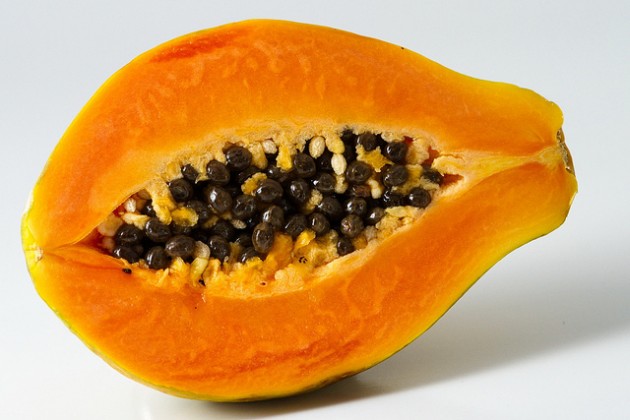 I’m a little concerned that the bags under my eyes might be permanent, but more than likely, they’ll go away soon.
I’m a little concerned that the bags under my eyes might be permanent, but more than likely, they’ll go away soon.
This happened last year, too, when I spent two and a half days in the hermetically sealed radical bubble that is the CLPP (Civil Liberties and Public Policy) conference.
My adrenaline is so high all day that it takes me hours at the end of each day to settle at the end of every day that it takes me hours to settle down enough to sleep, and when I can sleep, I resent it, because it takes me out of the space.
CLPP is held every year at Hampshire College in Amherst, Massachusetts. The full title of the conference is: From Abortion Rights to Social Justice: Building the Movement for Reproductive Freedom. It brings together folks (read: troublemakers) to strategize, present, discuss and build around reproductive justice.
On Friday, April 12th , I got on a bus in New York at 8 am, singularly (creepily) focused on getting to CLPP by 4 pm, which is when the first workshop slot of the conference began. I had planned to attend “The Papaya Workshop: An Introduction to Early Abortion,” presented by the Reproductive Health Access Project, since seeing the conference schedule. In the workshop, we would watch a simulation of an options counseling session, and learn how both early abortion procedures work, including a demonstration of a manual vacuum aspiration (MVA) abortion on a papaya.
- No Comments
 Please wait...
Please wait...

